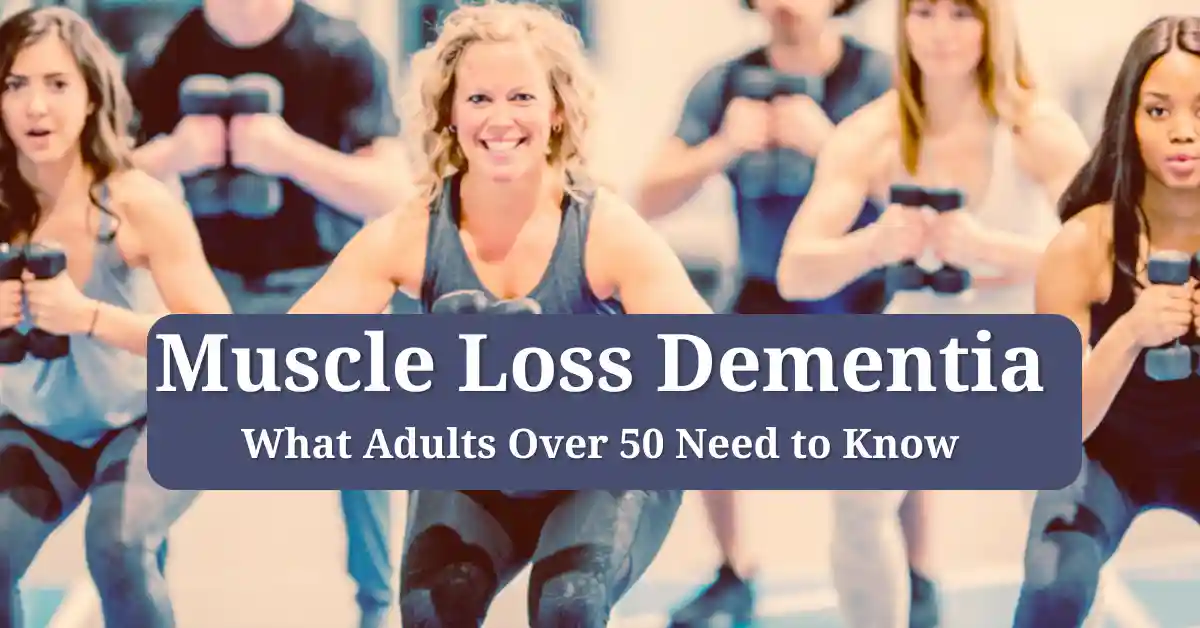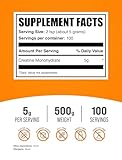You might be surprised to learn that losing muscle as you age could increase your risk of dementia by up to 60%. New research reveals a powerful connection between muscle loss and brain health that every adult over 50 needs to understand.
While it’s normal to feel concerned about both physical and mental changes as you age, the good news is that this connection gives you real power to protect your brain health through actions you can take today.
Table of Contents
What Research Shows About Muscle Loss and Dementia Risk
Recent studies from Johns Hopkins University have uncovered something remarkable: Adults with smaller muscle mass are 60% more likely to develop dementia compared to those who maintain their muscle strength. This isn’t just about feeling weaker. It’s about protecting your memory, thinking ability, and independence as you age.

The research followed 621 adults without dementia for nearly six years. Scientists measured a specific muscle in the head called the temporalis muscle, which moves your jaw. They found that people with smaller muscles showed:
- 60% higher dementia risk even after accounting for other factors
- Greater memory decline over time
- More brain shrinkage in areas crucial for memory
- Poorer performance on thinking tests
Why This Matters More Than You Think
“We found that older adults with smaller skeletal muscles are about 60% more likely to develop dementia when adjusted for other known risk factors,” explains Dr. Marilyn Albert, a leading researcher at Johns Hopkins.
You don’t have to accept muscle loss as inevitable. Understanding this connection means you have a new tool to fight both physical weakness and memory problems.
What Is Muscle Loss (Sarcopenia)?
Muscle loss, called sarcopenia by doctors, is the gradual decrease in muscle mass that happens as we age. After age 50, most people lose 1-2% of their muscle mass each year. This might not sound like much, but it adds up quickly.
Here’s what muscle loss looks like in real life:
- Struggling to carry groceries you used to handle easily
- Feeling tired after walking up stairs
- Having trouble getting up from low chairs
- Losing your balance more often
- Feeling weaker during daily activities
The Hidden Role Your Muscles Play
Your muscles do much more than help you move. They’re actually like a hormone factory, releasing special chemicals called myokines into your bloodstream. These chemicals:
- Help control blood sugar and support your liver
- Fight inflammation throughout your body
- Support nerve cell function in your brain
- Protect against age-related damage to cells and tissues
When you lose muscle, you lose this protective chemical factory. This leaves your brain more vulnerable to the inflammation and damage that can lead to dementia.
How Do Doctors Measure Muscle Loss?
Traditional ways to check for muscle loss include:
- Hand grip strength tests – You squeeze a device as hard as you can
- Walking speed measurements – How quickly you can walk a set distance
- Chair stand tests – How many times you can stand up and sit down in 30 seconds
- Body composition scans – Special machines that measure muscle vs. fat
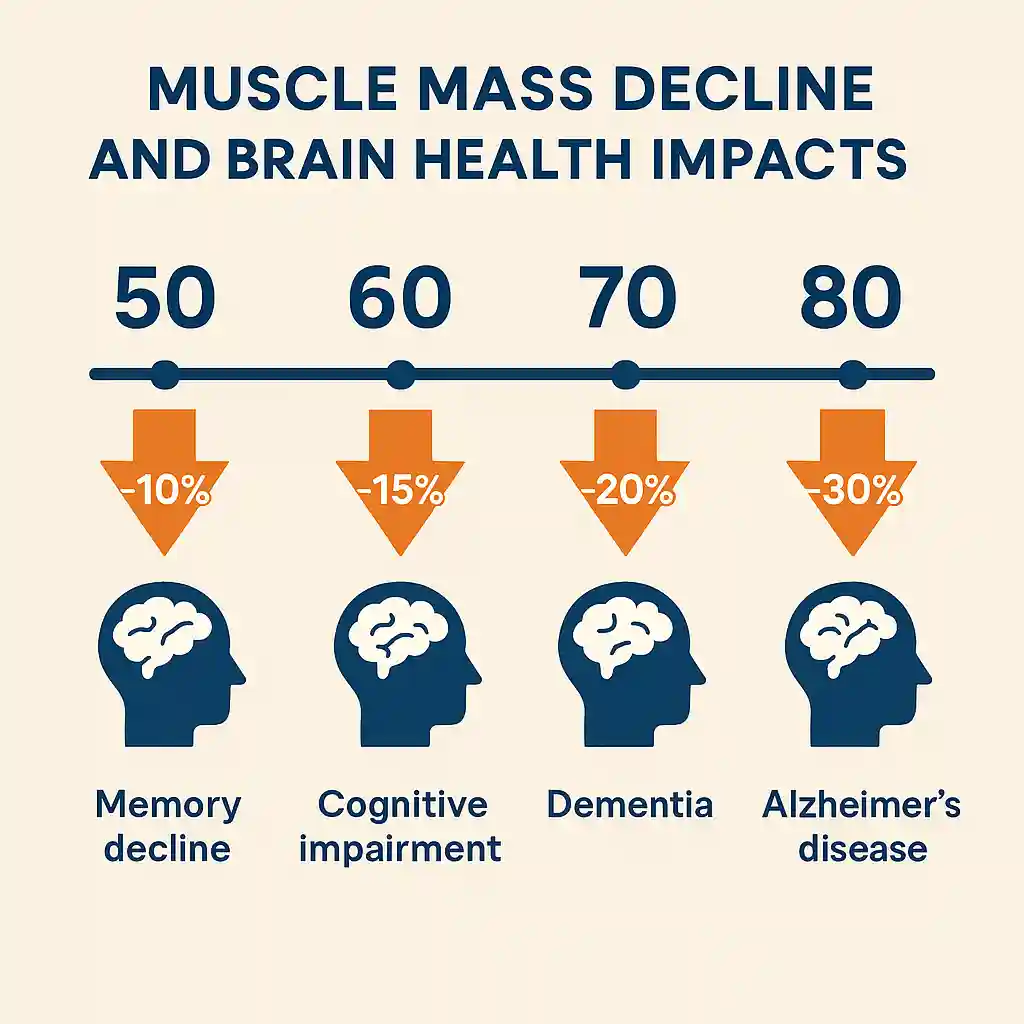
The New Brain Scan Method
The Johns Hopkins research used brain MRI scans to measure the temporalis muscle in your head. This muscle, which helps you chew, reflects your overall muscle health throughout your body.
This approach is exciting because:
- It uses scans many older adults already get for other reasons
- It doesn’t require additional tests or costs
- It gives doctors an early warning system for dementia risk
Why Does Muscle Loss Dementia Connection Exist?
The muscle loss dementia link isn’t random. Several important mechanisms connect your muscles to your brain health:
1. Inflammation Control
Healthy muscles release anti-inflammatory chemicals. When you lose muscle, inflammation increases throughout your body, including in your brain. Chronic inflammation damages brain cells and contributes to dementia.
2. Blood Sugar Regulation
Muscles help control your blood sugar levels. Poor blood sugar control damages blood vessels in your brain and increases dementia risk.
3. Physical Activity Connection
Strong muscles encourage you to stay active. Physical activity is one of the most powerful ways to protect your brain and build new brain cells.
4. Stress Hormone Balance
Muscle loss often comes with increased stress hormones like cortisol. High cortisol levels over time can damage memory centers in your brain.
What Increases Your Risk of Muscle Loss?
Understanding your risk factors helps you take action before problems develop:
Lifestyle Factors:
- Physical inactivity – Not using your muscles regularly
- Poor protein intake – Not eating enough muscle-building foods
- Social isolation – Less motivation to stay active and eat well
Health Conditions:
- Diabetes and blood sugar problems
- Cancer and cancer treatments
- Heart disease that limits activity
- Chronic inflammatory conditions
Natural Changes:
- Hormone changes after menopause or andropause
- Slower metabolism as you age
- Reduced appetite that leads to poor nutrition
Are You at Higher Risk?
You might have higher risk for muscle loss if you:
- Spend most of your day sitting
- Have lost weight without trying
- Feel tired during normal daily activities
- Have chronic health conditions
- Take medications that affect appetite or energy
- Have experienced major life stresses or depression
The Good News: You Can Fight Back
The most important thing to understand is that muscle loss isn’t inevitable. Research shows that even adults in their 80s and 90s can build muscle and improve brain health with the right approach.
Strength Training: Your Secret Weapon
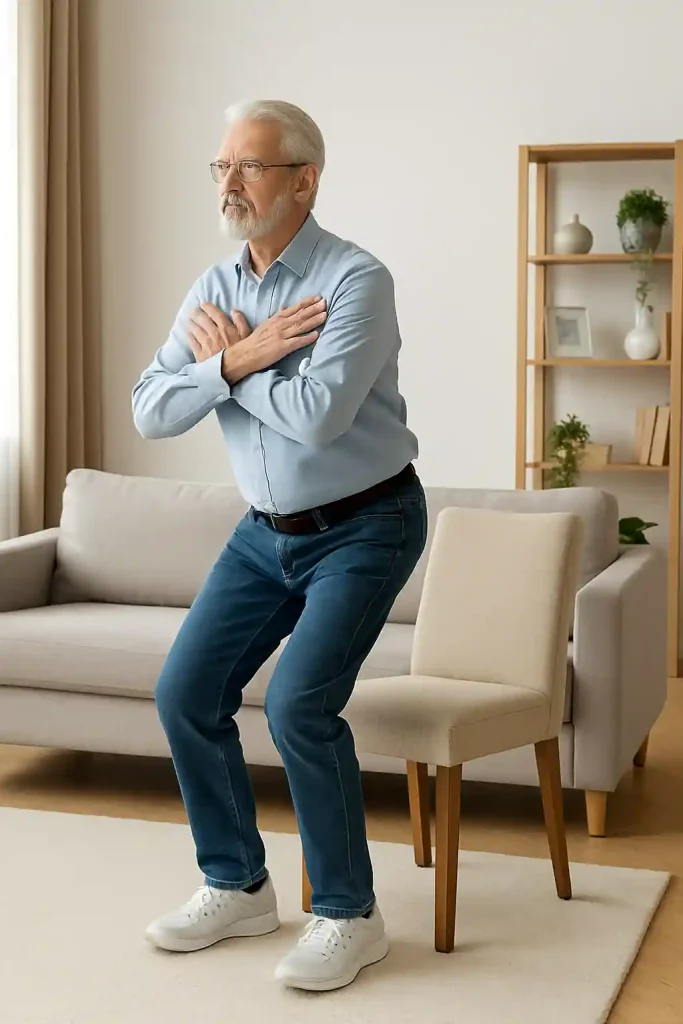
Resistance exercise is the most powerful tool you have to fight muscle loss and protect your brain. You don’t need to become a bodybuilder. Simple strength training 2-3 times per week can:
- Stop muscle loss and even reverse it
- Improve memory and thinking within just a few months
- Increase confidence in your physical abilities
- Boost mood and reduce anxiety about aging
Easy Ways to Start:
- Chair exercises using your body weight
- Light dumbbells or resistance bands
- Bodyweight movements like wall push-ups
- Functional activities like carrying groceries or gardening
Protein: The Building Block Your Body Needs
Most adults over 50 need more protein than younger people. Aim for 1.2-1.6 grams of protein per kilogram of body weight daily. For a 150-pound person, that’s about 80-110 grams of protein daily.
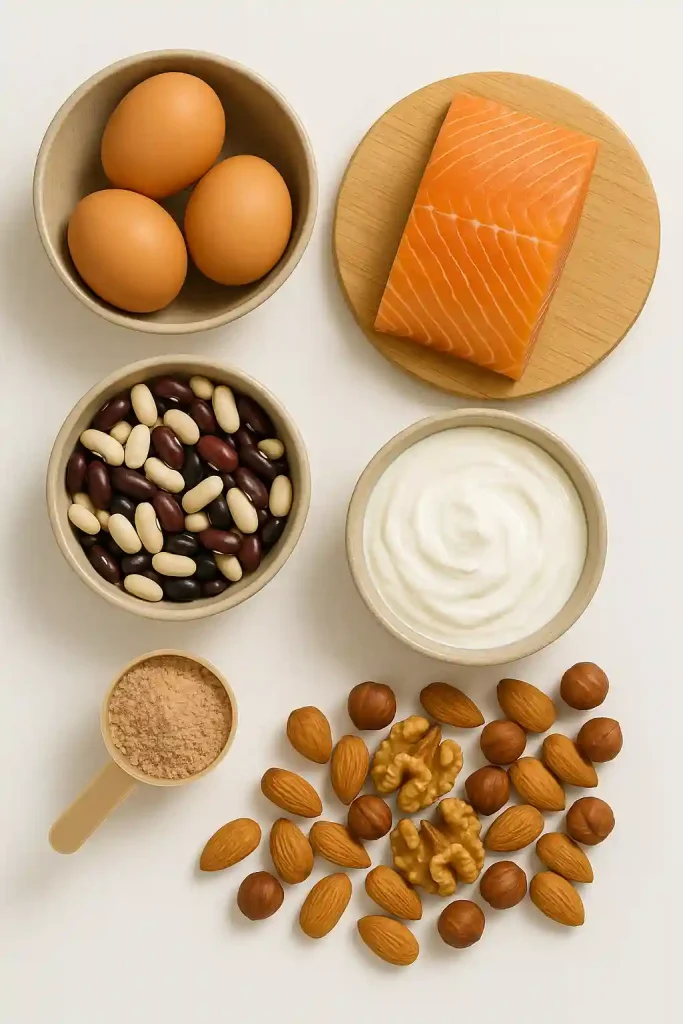
High-Quality Protein Sources:
- Lean meats like chicken, turkey, and fish
- Eggs – one of the most complete proteins
- Greek yogurt and cottage cheese
- Beans and lentils for plant-based options
- Nuts and seeds for easy snacking
Smart Protein Tips:
- Spread protein throughout the day, not just at dinner
- Include protein in every meal and snack
- Consider protein powder if you struggle to eat enough
- Focus on high-quality sources your body can easily use
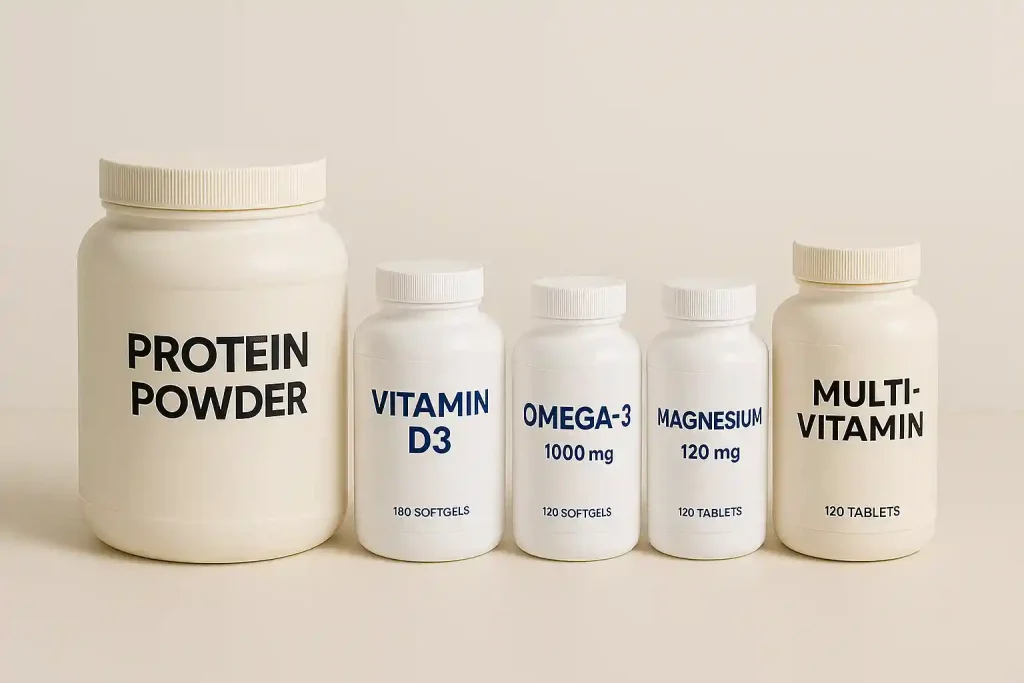
What You Can Do Starting Today
Week 1: Assessment and Planning
- Talk to your doctor about muscle health and dementia risk
- Assess your current strength with simple tests at home
- Track your protein intake for a few days to see where you stand
- Identify barriers that keep you from being more active
Month 1: Building Habits
- Start chair exercises 10-15 minutes, 3 times per week
- Add protein to every meal and snack
- Take the stairs when possible
- Schedule strength training like any other important appointment
Month 3: Seeing Progress
- Increase exercise intensity gradually as you get stronger
- Try new activities to keep exercise interesting
- Monitor improvements in daily activities like climbing stairs
- Celebrate victories – even small improvements matter
Common Concerns and Solutions
“I’m Too Old to Start Exercising”
Research shows it’s never too late to benefit from strength training. Studies include people well into their 90s who built muscle and improved brain function. Start slowly and progress gradually.
“I Don’t Want to Get Bulky”
Building healthy muscle doesn’t mean getting bulky. You’re aiming for functional strength that helps you live independently and protects your brain.
“I Have Health Conditions”
Most health conditions improve with appropriate exercise. Work with your doctor to create a safe plan that accounts for your specific needs.
“I Can’t Afford a Gym”
You can build muscle at home with minimal equipment. Bodyweight exercises, resistance bands, and light weights are affordable and effective.
Warning Signs to Watch For
Contact your doctor if you notice:
- Sudden weakness or difficulty with normal activities
- Unintentional weight loss of more than 5% of your body weight
- Frequent falls or balance problems
- Memory changes along with physical weakness
- Loss of appetite lasting more than a few days
When to Seek Professional Help
Consider working with professionals if you:
- Have multiple health conditions that affect exercise safety
- Haven’t exercised in many years
- Need help creating a nutrition plan
- Want personalized guidance for your specific situation
The Bottom Line: Take Action Now
The connection between muscle loss and dementia gives you power, not fear. Every day you maintain or build muscle is a day you’re protecting your brain and your future independence.
Key takeaways to remember:
- Muscle loss increases dementia risk by up to 60% – but it’s preventable
- Strength training and adequate protein are your most powerful tools
- It’s never too late to start building muscle and protecting your brain
- Small, consistent actions lead to significant long-term benefits
- You have more control over aging than you might think
The research is clear: taking care of your muscles means taking care of your mind. You don’t have to accept weakness or memory problems as inevitable parts of aging. Start with one small step today – your future self will thank you.
Your muscles and your brain are partners in helping you live the life you want as you age. By understanding this connection and taking action, you’re not just fighting muscle loss – you’re investing in your cognitive health, independence, and quality of life for years to come.
About This Article: This muscle loss dementia information is based on recent research from Johns Hopkins University and other leading medical institutions. Always consult with your healthcare provider before starting new exercise programs or making significant dietary changes, especially if you have existing health conditions. For more muscle loss dementia prevention resources, explore our related articles on strength training for seniors, nutrition after 50, and starting a fitness program.

Claudia Faucher is a fitness and lifestyle blogger who shares practical tips for women over 50 on staying active, stylish, and confident. As the creator of FitFab50.com and Beyond59.com, she covers topics like workout gear, beauty trends, and wellness routines. Claudia is passionate about helping others live their best life at any age.
Last update on 2026-02-22 / Affiliate links / Images from Amazon Product Advertising API
